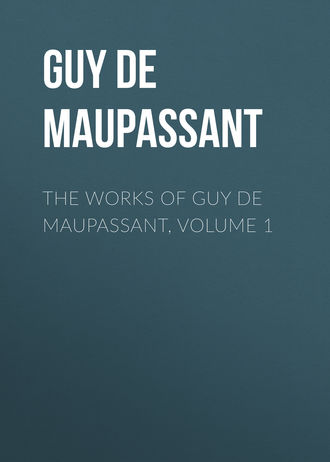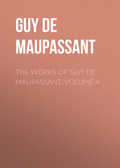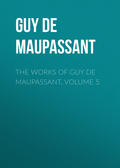
Ги де Мопассан
The Works of Guy de Maupassant, Volume 1
A PHILOSOPHER
Blérot had been my most intimate friend from childhood; we had no secrets from each other, and were united heart and soul by a brotherly intimacy and a boundless confidence in each other, and I had been intrusted with the secret of all his love affairs, as he had been with mine.
When he told me that he was going to get married I was hurt, just as if he had been guilty of a treacherous act with regard to me. I felt that it must interfere with that cordial and absolute affection which had united us hitherto. His wife would come between us. The intimacy of the marriage-bed establishes a kind of complicity of mysterious alliance between two persons, even when they have ceased to love each other. Man and wife are like two discreet partners who will not let anyone else into their secrets. But that close bond which the conjugal kiss fastens is widely loosened on the day on which the woman takes a lover.
I remember Blérot's wedding as if it were but yesterday. I would not be present at the signing of the marriage contract, as I have no particular liking for such ceremonies, but I only went to the civil wedding and to the church.
His wife, whom I had never seen before, was a tall, slight girl, with pale hair, pale cheeks, pale hands, and eyes to match. She walked with a slightly undulating motion, as if she were on board a ship, and seemed to advance with a succession of long, graceful curtsies.
Blérot seemed very much in love with her. He looked at her constantly, and I felt a shiver of an immoderate desire for her pass through my frame.
I went to see him in a few days, and he said to me:
"You do not know how happy I am; I am madly in love with her; but then she is … she is …" He did not finish his sentence, but he put the tips of his fingers to his lips with a gesture which signified:
"Divine! delicious! perfect!" and a good deal more besides.
I asked, laughing, "What! all that?"
"Everything that you can imagine," was his answer.
He introduced me to her. She was very pleasant, on easy terms with me, as was natural, and begged me to look upon their house as my own. I felt that he, Blérot, did not belong to me any longer. Our intimacy was altogether checked, and we hardly found a word to say to each other.
I soon took my leave, and shortly afterwards went to the East, and returned by way of Russia, Germany, Sweden, and Holland, after an absence of eighteen months from Paris.
The morning after my arrival, as I was walking along the boulevards to breathe the air once more, I saw a pale man with sunken cheeks coming towards me, who was as much like Blérot as it was possible for a physically emaciated man to be to a strong, ruddy, rather stout man. I looked at him in surprise, and asked myself: "Can it possibly be he?" But he saw me, and came towards me with outstretched arms, and we embraced in the middle of the boulevard.
After we had gone up and down once or twice from the Rue Druot to the Vaudeville Theater, just as we were taking leave of each other – for he already seemed quite done up with walking – I said to him:
"You don't look at all well. Are you ill?"
"I do feel rather out of sorts," was all he said.
He looked like a man who was going to die, and I felt a flood of affection for my old friend, the only real one that I had ever had. I squeezed his hands.
"What is the matter with you? Are you in pain?"
"A little tired; but it is nothing."
"What does your doctor say?"
"He calls it anæmia, and has ordered me to eat no white meat and to take tincture of iron."
A suspicion flashed across me.
"Are you happy?" I asked him.
"Yes, very happy; my wife is charming, and I love her more than ever."
But I noticed that he grew rather red and seemed embarrassed, as if he was afraid of any further questions, so I took him by the arm and pushed him into a café, which was nearly empty at that time of day. I forced him to sit down, and looking him straight in the face, I said:
"Look here, old fellow, just tell me the exact truth."
"I have nothing to tell you," he stammered.
"That is not true," I replied firmly. "You are ill, mentally perhaps, and you dare not reveal your secret to anyone. Something or other is doing you harm, and I mean you to tell me what it is. Come, I am waiting for you to begin."
Again he got very red, stammered, and turning his head away, he said:
"It is very idiotic – but I – I am done for!"
As he did not go on, I said:
"Just tell me what it is."
"Well, I have got a wife who is killing me, that is all," he said abruptly, almost desperately.
I did not understand at first. "Does she make you unhappy? How? What is it?"
"No," he replied in a low voice, as if he were confessing some crime; "I love her too much, that is all."
I was thunderstruck at this brutal avowal, and then I felt inclined to laugh, but at length I managed to reply:
"But surely, at least so it seems to me, you might manage to – to love her a little less."
He had got very pale again, and at length made up his mind to speak to me openly, as he used to do formerly.
"No," he said, "that is impossible; and I am dying from it I know; it is killing me, and I am really frightened. Some days, like to-day, I feel inclined to leave her, to go away altogether, to start for the other end of the world, so as to live for a long time; and then, when the evening comes, I return home in spite of myself, but slowly, and feeling uncomfortable. I go upstairs hesitatingly and ring, and when I go in I see her there sitting in her easy chair, and she says, 'How late you are,' I kiss her, and we sit down to dinner. During the meal I think to myself: 'I will go directly it is over, and take the train for somewhere, no matter where;' but when we get back to the drawing-room I am so tired that I have not the courage to get up out of my chair, and so I remain, and then – and then – I succumb again."
I could not help smiling again. He saw it, and said: "You may laugh, but I assure you it is very horrible."
"Why don't you tell your wife?" I asked him. "Unless she be a regular monster she would understand."
He shrugged his shoulders. "It is all very well for you to talk. I don't tell her because I know her nature. Have you ever heard it said of certain women, 'She has just married a third time?' Well, and that makes you laugh like you did just now, and yet it is true. What is to be done? It is neither her fault nor mine. She is so, because nature has made her so; I assure you, my dear old friend, she has the temperament of a Messalina. She does not know it, but I do; so much the worse for me. She is charming, gentle, tender, and thinks that our conjugal intercourse, which is wearing me out and killing me, is natural and quite moderate. She seems like an ignorant schoolgirl, and she really is ignorant, poor child."
"Every day I form energetic resolutions, for you must understand that I am dying. But one look of her eyes, one of those looks in which I can read the ardent desire of her lips, is enough for me, and I succumb at once, saying to myself: 'This is really the end; I will have no more of her death-giving kisses,' and then, when I have yielded again, like I have to-day, I go out and walk on ahead, thinking of death, and saying to myself that I am lost, that all is over."
"I am so mentally ill that I went for a walk to Père Lachaise cemetery yesterday. I looked at all the graves, standing in a row like dominoes, and I thought to myself: 'I shall soon be there,' and then I returned home, quite determined to pretend to be ill, and so escape, but I could not."
"Oh! You don't know what it is. Ask a smoker who is poisoning himself with nicotine whether he can give up his delicious and deadly habit. He will tell you that he has tried a hundred times without success, and he will, perhaps, add: 'So much the worse, but I had rather die than go without tobacco.' That is just the case with me. When once one is in the clutches of such a passion or such a vice, one must give oneself up to it entirely."
He got up and gave me his hand. I felt seized with a tumult of rage, and with hatred for this woman, this careless, charming, terrible woman; and as he was buttoning up his coat to go out I said to him, brutally perhaps:
"But, in God's name, why don't you let her have a lover, rather than kill yourself like that?"
He shrugged his shoulders without replying, and went off.
For six months I did not see him. Every morning I expected a letter of invitation to his funeral, but I would not go to his house from a complicated feeling of contempt for him and for that woman; of anger, of indignation, of a thousand sensations.
One lovely spring morning I was walking in the Champs Elysées. It was one of those warm days which makes our eyes bright and stir up in us a tumultuous feeling of happiness from the mere sense of existence. Someone tapped me on the shoulder, and turning round I saw my old friend, looking well, stout and rosy.
He gave me both hands, beaming with pleasure, and exclaimed:
"Here you are, you erratic individual!"
I looked at him, utterly thunderstruck.
"Well, on my word – yes. By Jove! I congratulate you; you have indeed changed in the last six months!"
He flushed scarlet, and said, with an embarrassed laugh:
"One can but do one's best."
I looked at him so obstinately that he evidently felt uncomfortable, so I went on:
"So – now – you are – completely cured?"
He stammered, hastily:
"Yes, perfectly, thank you." Then changing his tone, "How lucky that I should have come across you, old fellow. I hope we shall often meet now."
But I would not give up my idea; I wanted to know how matters really stood, so I asked:
"Don't you remember what you told me six months ago? I suppose – I – eh – suppose you resist now?"
"Please don't talk any more about it," he replied, uneasily; "forget that I mentioned it to you; leave me alone. But, you know, I have no intention of letting you go; you must come and dine at my house."
A sudden fancy took me to see for myself how matters stood, so that I might understand all about it, and I accepted.
His wife received me in a most charming manner, and she was, as a matter of fact, a most attractive woman. Her long hands, her neck and cheeks were beautifully white and delicate, and marked her breeding, and her walk was undulating and delightful.
René gave her a brotherly kiss on the forehead and said:
"Has not Lucien come yet?"
"Not yet," she replied, in a clear, soft voice; "you know he is almost always rather late."
At that moment the bell rang, and a tall man was shown in. He was dark, with a thick beard, and looked like a modern Hercules. We were introduced to each other; his name was Lucien Delabarre.
René and he shook hands in a most friendly manner, and then we went to dinner.
It was a most enjoyable meal, without the least constraint. My old friend spoke with me constantly, in the old familiar cordial manner, just as he used to do. It was: "You know, old fellow!" – "I say, old fellow!" – "Just listen a moment, old fellow!" Suddenly he exclaimed:
"You don't know how glad I am to see you again; it takes me back to old times."
I looked at his wife and the other man. Their attitude was perfectly correct, though I fancied once or twice that they exchanged a rapid and furtive look.
As soon as dinner was over René turned to his wife, and said:
"My dear, I have just met Pierre again, and I am going to carry him off for a walk and a chat along the boulevards to remind us of old times. I am leaving you in very good company."
The young woman smiled, and said to me, as she shook hands with me:
"Don't keep him too long."
As we went along, arm-in-arm, I could not help saying to him, for I was determined to know how matters stood:
"I say, what has happened? Do tell me!"
He, however, interrupted me roughly, and answered like a man who has been disturbed without any reason.
"Just look here, old fellow leave one alone with your questions."
Then he added, half aloud, as if talking to himself:
"After all, it would have been too stupid to have let oneself go to pot like that."
I did not press him. We walked on quickly and began to talk. All of a sudden he whispered in my ear:
"I say, suppose we go and have a bottle of 'fizz' with some girls! Eh?"
I could not prevent myself from laughing heartily.
"Just as you like; come along, let us go."
ALWAYS LOCK THE DOOR!
The four glasses which were standing in front of the diners were now still nearly half full, which is a sign, as a general rule, that the guests are quite so. They were beginning to speak without waiting for an answer; no one took any notice of anything except what was going on inside him, either in his mind or stomach; voices grew louder, gestures more animated, eyes brighter.
It was a bachelors' dinner of confirmed old bachelors. They had instituted this regular banquet twenty years before, christening it "The Celibate," and at the time there were fourteen of them, all fully determined never to marry. Now there were only four of them left; three were dead and the other seven were married.
These four stuck firmly to it, and, as far as lay in their power, they scrupulously observed the rules which had been laid down at the beginning of their curious association. They had sworn, hand-in-hand, to turn aside every woman they could from the right path, and their friends' wives for choice, and more especially those of their most intimate friends. For this reason, as soon as any of them left the society, in order to set up in domestic life for himself, he took care to quarrel definitely with all his former companions.
Besides this, they were pledged at every dinner to relate most minutely their last adventures, which had given rise to this familiar phrase amongst them:
"To lie like an old bachelor."
They professed, moreover, the most profound contempt for woman whom they talked of as an animal made solely for their pleasure. Every moment they quoted Schopenhauer, who was their god, and his well-known essay "On Women;" they wished that harems and towers might be reintroduced, and had the ancient maxim: "Mulier, perpetuus infans,"10 woven into their table-linen, and below it, the line of Alfred de Vigny's:
La femme, enfant malade et douze fois impure.11
So that by dint of despising women they lived only for them, while all their efforts and all their desires were directed towards them.
Those of them who had married called them old fops, made fun of them, and – feared them.
When they began to feel the exhilarating effects of the champagne, this was the moment that their old bachelor experiences began.
On the day in question, these old fellows, for they were old by this time, and the older they got the more extraordinary good fortune in the way of love affairs they had to relate, were quite inexhaustible. For the last month, to hear them, each of them had played the gallant with at least one woman a day; and what women! the youngest, the noblest, the richest, and the most beautiful!
After they had finished their tales, one of them, he who having spoken first had been obliged to listen to all the others, rose and said:
"Now that we have finished drawing the long-bow, I should like to tell you, not my last, but my first adventure, – I mean the first adventure of my life, my first fall, – for it is a moral fall after all, in the arms of Venus. Oh! I am not going to tell you my first – what shall I call it? – my first appearance; certainly not. The leap over the first hedge (I am speaking figuratively) has nothing interesting about it. It is generally rather a disagreeable one, and one picks oneself up rather abashed, with one charming illusion the less, with a vague feeling of disappointment and sadness. That realization of love the first time one experiences it is rather repugnant; we had dreamt of it as being so different, so delicate, so refined. It leaves a physical and moral sense of disgust behind it, just like as when one has happened to have put one's hand into some clammy matter and feels in a hurry to wash it off. You may rub it as hard as you like, but the moral feeling remains.
"Yes! but one very soon gets quite used to it; there is no doubt about that. For my part, however, I am very sorry it was not in my power to give the Creator the benefit of my advice when He was arranging these little matters. I wonder what I should have done? I am not quite sure, but I think with the English savant, John Stuart Mill, I should have managed differently; I should have found some more convenient and more poetical combination; yes – more poetical.
"I really think that the Creator showed Himself to be too much of a naturalist … too … what shall I say? His invention lacks poetry.
"However, what I am going to tell you is about my first woman of the world, the first woman in society I ever made love to; – I beg your pardon, I ought to say the first woman of the world that ever triumphed over me. For at first it is we who allow ourselves to be taken, while, later on – well, then it is quite another matter.
"She was a friend of my mother's, a charming woman in every way. When such women are chaste, it is generally from sheer stupidity, and when they are in love they are furiously so. And then —we are accused of corrupting them! Yes, yes, of course! With them it is always the rabbit that begins and never the sportsman. I know all about it; they don't seem to put their fingers near us, but they do it all the same, and do what they like with us, without it being noticed, and then they actually accuse us of having ruined them, dishonored them, humiliated them, and all the rest of it.
"The woman in question certainly had a great desire to be humiliated by me. She may have been about thirty-five, while I was scarcely two-and-twenty. I no more thought of dishonoring her than I did of turning Trappist. Well, one day when I was calling on her, and while I was looking at her dress with considerable astonishment, for she had on a morning wrapper which was open as wide as a church-door when the bells are ringing for service, she took my hand and squeezed it – squeezed it, you know, like they will do at such moments – and said, with a deep sigh, one of those sighs, you know, which come from right down the bottom of the chest: 'Oh! don't look at me like that, child!' I got as red as a tomato, and felt more nervous than usual, naturally. I was very much inclined to bolt, but she held my hand tightly, and putting it onto her well-developed bust, she said: 'Just feel how my heart beats!' Of course it was beating, and I began to understand what was the matter, but I did not know what to do. I have changed considerably since then.
"As I remained standing there, with one hand on the soft covering of her heart, while I held my hat in the other, and continuing to look at her with a confused, silly smile – a timid, frightened smile – she suddenly drew back, and said in an irritated voice:
"'Young man, what are you doing? You are indecent and badly brought up.'
"You may be sure I took my hand away quickly, stopped smiling, and stammering out some excuse, I got up and took my leave as if I had lost my head.
"But I was caught, and dreamt of her. I thought her charming, adorable; I fancied that I loved her, that I had always loved her, and I determined to see her again.
"When I saw her again she gave me a little smile like an actress might behind the scenes. Oh, how that little smile upset me! And she shook hands with a long, significant pressure.
"From that day it seems that I made love to her; at least, she declared afterwards that I had ruined her, captured her, dishonored her, with rare Machiavelism, with consummate cleverness, with the perseverance of a mathematician, and the cunning of an Apaché Indian.
"But one thing troubled me strangely; where was my triumph to be accomplished? I lived with my family, and on this point my family was most particular. I was not bold enough to venture to go to an hotel in broad daylight with a woman on my arm, and I did not know whom to ask for advice.
"Now, my fair friend had often said in joke that every young man ought to have a room for himself somewhere or other from home. We lived in Paris, and this was a sort of inspiration. I took a room, and she came. She came one day in November; I should have liked to put off her visit because I had no fire, and I had no fire because the chimney smoked. The very evening before, I had spoken to my landlord, a retired shopkeeper, about it, and he had promised that he would send for the chimneysweep in a day or two to get it all put to rights.
"As soon as she came in, I said:
"'There is no fire because my chimney smokes.'
"She did not even appear to hear me, but stammered: 'That does not matter, I have …;' and when I looked surprised, she stopped short in confusion, and then went on: 'I don't know what I am saying; I am mad… I have lost my head… Oh! what am I doing? Why did I come? How unhappy I am! What a disgrace, what a disgrace!' And she threw herself sobbing into my arms.
"I thought that she really felt remorse, and swore that I would respect her. Then, however, she sank down at my knees, sighing: 'But don't you see that I love you, that you have overcome me, that it seems as though you had thrown a charm over me?'
"Then I thought it was about time to show myself a man. But she trembled, got up, ran and hid behind a wardrobe, crying out: 'Oh! don't look at me; no! no! If only you did not see me, if we were only in the dark! I am ashamed in the light. Cannot you imagine it? What a dreadful dream! Oh! this light, this light!'
"I rushed to the window; I closed the outside shutters, drew the curtains, and hung a coat over a ray of light that peeped in, and then, stretching out my hands so as not to fall over the chairs, with my heart beating, and felt for her, and found her.
"It was a fresh journey for the two of us then, groping our way, with our hands united, towards the other corner where the sofa stood. I don't suppose we went straight, for first of all I knocked against the mantelpiece, and then against a chest of drawers, before finding what we wanted. After we sat down I forgot everything, and we almost went to sleep in each other's arms.
"I was half dreaming; but in my dream I fancied that someone was calling me and crying for help; then I received a violent blow, and opened my eyes.
"'O – h!' The setting sun, magnificent and red, shone full into the room through the door, which was wide open, and seemed to look at us from the verge of the horizon, illuminating us both, especially my companion, who was screaming, struggling, and twisting, and trying with hands and feet to get under the sofa, while in the middle of the room stood my landlord by the side of the concierge12 and a chimneysweep, as black as the devil, who were looking at us with stupid eyes.
"I stood up in rage, ready to jump at his throat, and shouted:
"'What the deuce are you doing in my room?'
"The chimneysweep laughed so that he let his brush fall on the floor. The porter looked as if he were going out of his mind, and the landlord stammered:
"'But, Monsieur, it was – it was – about the chimney – the chimney, the chimney which – '
"'Go to the devil!' I roared. So he took off his hat, which he had kept on in his confusion, and said, in a confused but very civil manner:
"'I beg your pardon, Monsieur; if I had known, I should not have disturbed you; I should not have come. The concierge told me you had gone out. Pray excuse me.' And they all went out.
"Ever since that time I never draw the curtains but am always very careful to lock the door first."






